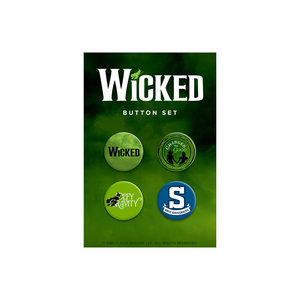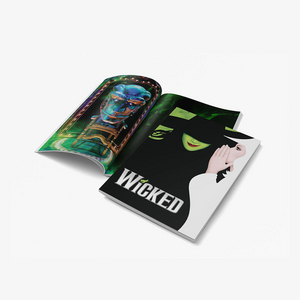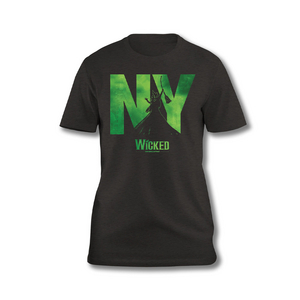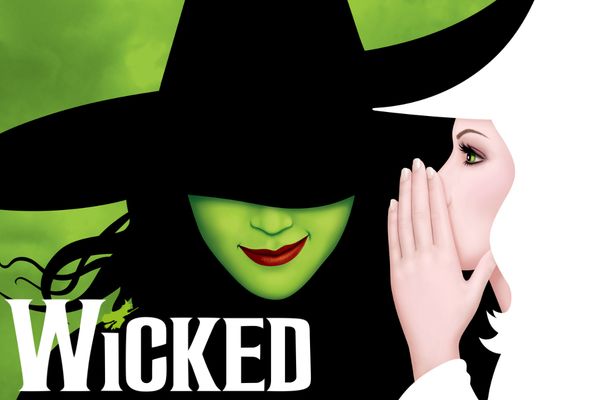BWW Interviews: Alex Wyse Talks WICKED, Boq, and His Career
Wicked, the musical that reminds us that so much happened before Dorothy dropped in OZ, is visiting Houston's Hobby Center for the Performing Arts for the fourth time this summer. There is no denying that excitement is growing in Houston. Billboards for the show line our highways, commercials play on our TVs and radios, and everyone is buzzing about the much-loved musical. Recently, I chatted with Alex Wyse, who joined the cast as Boq on June 6, 2013. He took a few minutes out of his busy tour and performance schedule to chat with me about Wicked and his incredible career.
BWW: How did you get started in theatre?
Alex Wyse: I was always doing theatre. From as far back as I can remember my parents would take me to see the touring shows that would come in. There was no question that I wanted to be in plays. I just loved it. I thought it was the coolest thing in the whole world. As soon as I was old enough, I think when I was 5 years old, I could start auditioning for youth theatre shows. My parents took me to audition, and I was just like, "I have to do this. You have to let me do this." So, I started doing youth theater, and I was in [Laughs] the chorus of OLIVER!. I was Londoner. I walked on, sang a measure of "Consider Yourself," walked off stage, and I was the happiest little boy in the world. So, I don't think there was ever anything else that I wanted to do. I've always loved theatre, and I was lucky that my parents were exposing me to it when I was a kid because they were theatre lovers. So, here I am! [Laughs]
BWW: You got started early on, but when did you know you wanted to be involved in theatre professionally?
Alex Wyse: Well, [Pauses] I think always. I would beg my parents to take me to New York to audition for shows. I remember seeing BEAUTY AND THE BEAST when I was 10 years old, and I thought, "Well this is bulls**t! I can do that!" [Laughs] I was like, "Mom, dad, take me! Let me do this!" And they said, "Absolutely not. You're not going to New York." [Laughs] I think then, as I became older, I was making a more mature and informed decision that this is something I think I am capable of doing, something I love doing, and something I want to study and devote my life to. As I became older, I looked at it from a more mature angle. Then, I studied theatre in college. I don't think there was ever a time where I didn't want to do it. I don't remember a time where I ever thought, "Maybe I'll be a doctor." That just didn't happen. I just did theatre, and I thought, "This is what I'm doing. This is what I'm supposed to do."
BWW: You were in the original Off-Broadway cast of LYSISTRATA JONES. You had your Broadway debut when the show transferred to the Walter Kerr Theater. What was that experience like?
Alex Wyse: That was a whirlwind. When I was cast in LYSISTRATA JONES Off-Broadway, I was excited that I was getting my Off-Broadway debut. I thought to myself, "Oh, finally, I can do something legitimate in New York." I never dreamed that it would take me to Broadway. Even though we were short lived, that was an incredible experience. [Pauses] What was so great was that almost the whole cast, with the exception of a few people, was making our Broadway debuts together. The people who had been on Broadway before had only been on stage in camps. They had pretty much only played ensemble roles. It felt like everybody was taking a big step forward together by doing this show.
It was a whirlwind, and we didn't know where the ground was. We were going along for the ride though, and we were all in that crazy thing together. The ups and the downs, and there were some serious ups and downs. There were moments where we were celebrating backstage and saying, "You're going to Broadway!" We were freaking out and calling our parents. And then there were moments where we sat in the auditorium of the Walter Kerr and they said, "You guys need to advertise more. You need to get people in the seats. We're in trouble! We're in trouble!" So, it was just wild. From start to finish, there was never a dull moment. There was never a moment where we settled into the show. It was a whirlwind, but I'm so happy I had that experience because I got to have my Broadway debut with a show I loved and a group I loved. It was very special to me and very sad when it ended.
BWW: I have to say this. Last summer, I saw you in the Off-Broadway musical TRIASSIC PARQ, and I loved the show so much.
Alex Wyse: [Laughs] Alright! Thank you so much!
BWW: I own the cast album. I listen to it all the time!
Alex Wyse: Yeeeeees! It makes me so happy. I loved that show so, so much. It was one of my favorite things. That was such a great show to be a part of. I was with the smartest people ever, and we were having the time of our lives doing that show. So, I'm glad you saw it.
BWW: So, what was it like being involved in such a campy and thought-provoking parody of the iconic film Jurassic Park?
Alex Wyse: [Laughs] The way we looked at it, we never thought to ourselves that we were doing something that was ridiculous or that we were doing a parody. We didn't approach it from that perspective. We looked at this as our own heartfelt, serious story of dinosaurs coming of age. We just happened to be dinosaurs, and it just happened to be in the context of Jurassic Park. But, we approached it-and this is a testament to Marshall Pailet, the main writer and the director of our show-he basically set this up as if we were doing Arthur Miller. We found as much truth as we possibly could, and then the humor came from that. So, it all started with us establishing relationships and building our physicalities and building our stamina. So, on top of that, we were able to have humor, and it became what it became. It became TRIASSIC PARQ.
It was the most incredible ensemble experience I've ever had. We were building this show in so many ways from the ground up. They had done some previous incarnations, but we were developing this, it was being tailored to us, and it was being rewritten around all of us. Our improvs and contributions became a part of the script, a part of the music, and everything. It felt like we built that show together, and I don't know if I've ever been so proud of anything as I was of TRIASSIC PARQ. It felt so much like we built it from our sweat, our guts, and everything. It was so much fun!
I've worked with a lot of wonderful people, but the number of intelligent and good actors and musicians in that room! There was not a single weak link through the entire creative team and the cast. It was pretty tremendous. I don't know if I'm going to have many experiences that are as special as TRIASSIC PARQ was to me, and those guys are still a lot of my best friends. We were sad that it didn't move on past the SoHo Playhouse. We were pretty close. We almost made the move, but we didn't. And that's ok because that experience was pretty much perfect for me. It was also some of the hardest that I've ever worked.
BWW: I think you could tell that from the audience, for those of us who did see it. It was mind blowing how good it was. My wife and I sat there and were like, "Wow! This is incredible." It was the best experience I have ever had in a theatre in New York, hands down.
Alex Wyse: David, thank you so much. I'm happy to hear you say that. That's how it felt for us too. There was never a moment on that stage where we phoned it in. Even when there were ten people in the audience, we were still working our asses off to create this world and throw ourselves into it at 110 miles per hour. It was pretty exhilarating to do and be a part of.
BWW: You were also cast in Stafford Arima's Off-Broadway revival of BARE. What was it like being involved in a show with such a strong cult following and very poignant messages?
Alex Wyse: Well, the cult following and the poignant messages, those are two very different things. But being involved in a show with a cult following felt like a lot of pressure, and there were a lot of expectations. So, I think for people who had enjoyed the show, they had to put aside their expectations. We could only do what we could do, and they wanted to take the show in a whole new direction. To be honest, I don't know the original BARE very well, and I'm glad I don't because I was just able to go along with the direction they took us in.
What was interesting about that experience was a lot of people who saw the original came to see this show, and they all had their opinions, good or bad. Everybody had an opinion, and they were eager to share their opinions with us. I couldn't do anything about it. I could just say, "Ok. Thank you." What could I do? I didn't create the show. I was just there to put it out there, and I was proud of the work we did. What was interesting was after all that talk of "was it like the original, was it unlike the original, did we like it less, did we like it more," after all that buzz died away, what we were left with was all of these kids who had come to see the show over and over, who needed to hear this message and who needed this story to happen. These kids were too young when the original show was happening, so it was great feeling like we reached a whole new generation of young theatergoers.
It wasn't about which song was cut, but it was about this story of acceptance of one's self that touched a lot of kids. They'd write us letters and they'd talk to us at the stage door. That experience made the whole show worth it. I didn't care if it was like the original or not. What I cared about were these kids who needed to hear this story and who felt moved by what we had to say. That was so, so special, and I wouldn't trade that. It was very cool to be part of something like that, that had a social message that a lot of kids needed to hear.
BWW: That's awesome. That's good to hear. I wanted to see it, but I didn't make it to New York during the run. I was curious, and all I had was the BroadwayWorld message boards. I saw terrible things, but I also saw some really uplifting things. So, I was like, "I don't know. I don't know how I'd feel about it."
Alex Wyse: Everybody had an opinion because everybody feels like they have an ownership of the show, like they have a stake in it. Because they know the songs or they saw the original, they feel like it belongs to them. It was great was when people could just get over that and think about the message. I think maybe there's something to be said for both versions, but the idea of this new version was that the message would be clearer and it would hit home with a current audience. That's what they went for. I think, in a lot of ways, they achieved that. And, we were proud of what we did, even with all the opinions surrounding it.
BWW: Before being cast as Boq in Wicked, you'd mostly done work Off-Broadway. Is there a difference between preparing and rehearsing for Off-Broadway shows and a tour of one of Broadway's biggest hits?
Alex Wyse: The way that this works is that I came in for a week and a half, [Laughs] basically. I learned the role, and I was doing the show. I was putting myself into an already established machine with this show. Whereas, with BARE, LYSISTRATA JONES, or TRIASSIC PARQ, especially, we were creating something from the ground up. So, this is interesting. This is a new kind of experience to fit myself into a machine-a pretty great machine, but a machine none-the-less. So, it's a different experience in that. The challenge then, as an actor, is just to find ways you can still be creative and bring yourself to it even though you have to put your left foot on a red at this part and so on. It's a different kind of process, but hopefully the end result, if you're a smart enough actor, is roughly the same because you're doing a show that you care about and you feel that you've created, even though you haven't. That's the challenge, to bring your self to that same place even though it's a very different process coming into it. So, I think that's what it's like. I love being a part of something that is this big, this beloved, that I know we're going to get an audience [Laughs], the audience is going to cheer, and I know how long the job is going to last. That's pretty cool. [Laughs] I'm not used to that! So, [Pauses] it's certainly different, but hopefully you can get to the same place of feeling like you are going out there and creating something.
BWW: What is like going from the intimacy of Off-Broadway to playing in the large venues that Wicked books into?
Alex Wyse: I don't know. It doesn't feel that different. I guess all that's different is how big your performance becomes, you know. When you're playing to smaller houses, you can be subtle and intimate. When you're doing a show like Wicked and you're playing to 3,000 people in one night, you have to project your performance to the back row of the theatre. So, it's just a matter of bringing in your technique and letting yourself either be intimate or larger-whatever the opposite of intimate is [Laughs]. It's just a matter of projecting it out. But, hopefully, it's the same. The foundation is there either way, and it's still coming from an honest place. That's the goal. You still want it to be real, and it's just a matter of how large that realness is.
BWW: Are you and Boq alike in any ways?
Alex Wyse: I can bring the awkward and shy parts of myself to Boq, and the heartfelt part of myself to Boq. Boq is a character with a big heart, and he's driven by his heart throughout the show. In a lot of ways, I can relate to that. So, I can bring those parts of myself to the character. That's been nice.
BWW: This October, Wicked will be celebrating its 10th anniversary on Broadway. In your opinion, what about the show has given it such staying power?
Alex Wyse: I think that anybody can relate to the show. It's a story about friendship, and it's a story about feeling like an outsider. I think everyone has felt like an outsider, and everyone has looked for a friend in that adversity. So, I think that message has made it into a timeless show. On top of that, it's based around a story that we all love-THE WIZARD OF OZ. You'd be hard-pressed to find someone who hasn't seen THE WIZARD OF OZ. And, it's great! The music is great. The script is funny. It's a big show with a million companies, but it's a really good show. It's funny. It's heartfelt. It deserves to be where it is in the pantheon of theatre. I love it.
BWW: In 2010, The New York Musical Theatre Festival premiered your musical NIGHTTIME TRAFFIC. What was that experience like?
Alex Wyse: That was a learning experience for me. It was great to be able to work on my own writing on such a scale. I've learned a lot about the show, what I can do, and what I want it to be. Since then, I have continued to work on it. One thing that is very important that I've learned about is figuring out ways to hold on to your work when there are so many other people pushing and pulling at it, or reviewers and New York audiences coming in with their opinions. Figuring out ways to hold on to what's at the center of that, your core vision, through all of that was the most important thing I learned. That was an amazing experience, a great platform for me, and a great way to start off what I hope can be a long career writing as well because that's something else that is really important to me. So, hopefully, you'll be seeing more of NIGHTTIME TRAFFIC. Keep a look out because it's not done yet.
BWW: Awesome. That bleeds into my next question. Are there any plans for future mountings of NIGHTTIME TRAFFIC?
Alex Wyse: Yeah! I've continued to work on the show. My director of TRIASSIC PARQ is my director of NIGHTTIME TRAFFIC, so Marshall Pailet is helping me do this show now. He is incredible and so smart. I'm really glad that I have him helping me out. I can't get into any specifics, but the hope is that this will happen again. At some point somehow it will happen again.
BWW: What inspired you to write the music, lyrics, and book for NIGHTTIME TRAFFIC?
Alex Wyse: I don't know if I could tell you exactly what inspired it, but I just know that a lot of experiences that I had in my life found ways to channel into this story about a relationship and taking a moment for one's self. It's kind of been like a journal [Laughs] for me. It's really developed as I have through the years, and it's been great. So, yeah, without getting too specific, I'd say it's just kind of been an outlet for everything.
BWW: What advice would you offer to anyone else who is trying to become an actor or writer for theatre?
Alex Wyse: I would say you have to do the thing that you do. Figure out what it is that you do, and do it as truthfully as you can. Don't worry about fitting into somebody else's shoes. I'd say build your own shoes. Then, no matter what, you'll be truthful to yourself and you'll pave your own way.
Wicked runs from July 10 to August 11, 2013 in the Sarofim Hall at the Hobby Center, 800 Bagby Street, Houston. Limited tickets are still available to this summer's month long run of Wicked, so get them now and don't be left green with envy! For more information and tickets please visit http://houston.broadway.com or call (800) 952 - 6560.
Photo courtesy of Broadway Across America - Houston.







